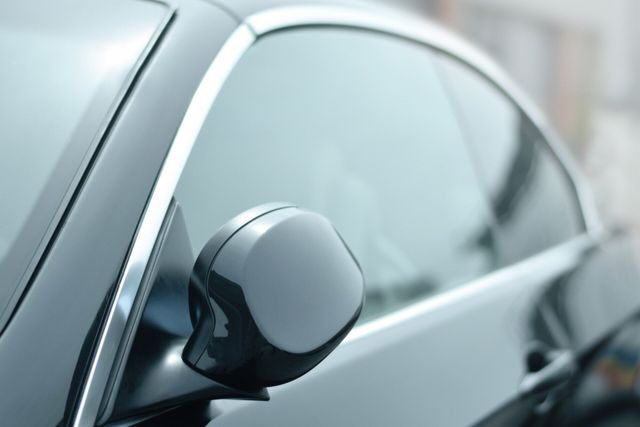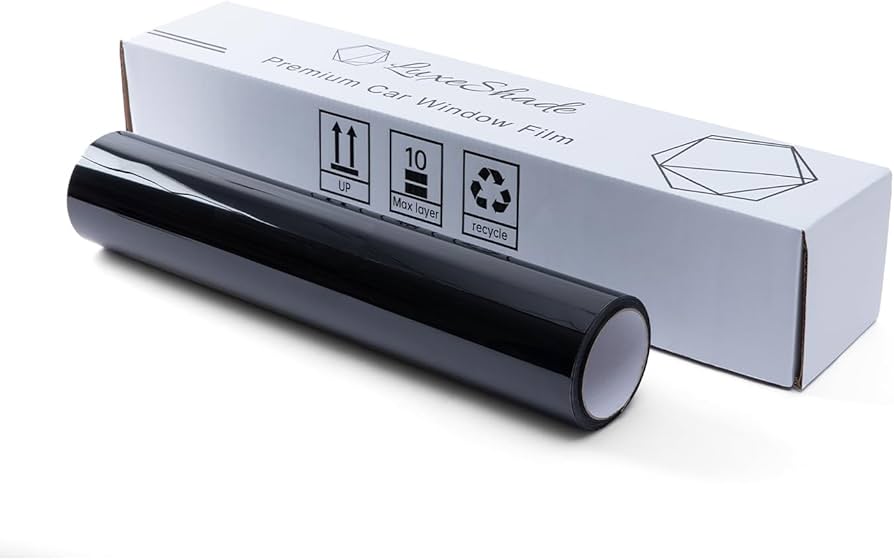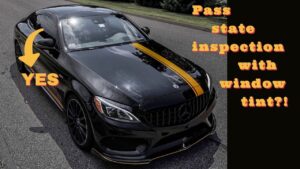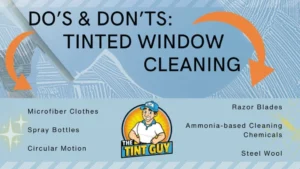As an Amazon Associate, I earn from qualifying purchases
Have you ever wondered if auto window tinting really protects you from harmful UV rays? You spend a lot of time in your car, and those rays can sneak in through your windows without you even noticing.
What if there was a simple way to shield yourself, your passengers, and even your car’s interior from damage? You’ll discover how effective window tinting truly is for UV protection—and why it might be one of the smartest upgrades you can make for your vehicle.
Keep reading to find out how this small change can make a big difference for your health and comfort.
Benefits Of Auto Window Tinting
Auto window tinting offers several benefits beyond just making your car look good. It provides important protection against harmful UV rays. Tinting also helps keep your car’s interior in better shape for longer. Drivers enjoy a more comfortable ride with less glare and heat. These advantages make window tinting a smart choice for many vehicle owners.
Reducing Uv Exposure
Window tint blocks a large amount of ultraviolet rays. UV rays can damage your skin and cause health problems. Tinting helps protect drivers and passengers from these harmful rays. It also reduces the risk of sunburn inside the car. This protection matters especially on long drives or sunny days.
Improving Interior Longevity
Sunlight can fade and crack seats, dashboard, and trim. Window tint reduces this sun damage by limiting UV light inside. This keeps your car’s interior looking newer for years. Protecting the materials saves money on repairs and replacements. A well-maintained interior also adds value to your vehicle.
Enhancing Driver Comfort
Tinted windows reduce glare from sunlight and headlights. This lowers eye strain and helps you focus on the road. Tinting also cuts down heat build-up inside the car. A cooler cabin makes driving more pleasant, especially in hot weather. Comfort improves safety by keeping drivers alert and relaxed.

Credit: www.raynofilm.com
Types Of Window Tints
Window tints come in several types. Each type offers different levels of UV protection. Some focus on blocking sunlight, while others add strength to your glass. Understanding these types helps you choose the best tint for your needs.
Dyed Window Films
Dyed window films use a layer of dye to absorb sunlight. They reduce glare and provide some UV protection. These films are affordable and help keep your car cool. Over time, the dye may fade or change color.
Metalized Films
Metalized films have tiny metal particles. These particles reflect sunlight and block UV rays effectively. They are strong and add extra protection to your windows. Metalized films can cause signal interference with devices.
Ceramic Films
Ceramic films use ceramic particles to block UV rays. They offer excellent heat reduction without affecting signals. These films are durable and resist fading. Ceramic tints provide high UV protection and clear visibility.
How Window Tints Block Uv Rays
Auto window tinting does more than darken your car’s glass. It acts as a shield against harmful ultraviolet (UV) rays. Understanding how window tints block UV rays helps you see their true value. Let’s explore the science behind this protection.
Window tints use special materials to reduce UV radiation inside your car. This keeps you safe and your interior cooler. The level of protection depends on the tint type and quality.
Uv Radiation And Its Effects
UV rays come from the sun and carry high energy. They can cause skin damage, eye problems, and fading of car interiors. UV rays are invisible but very strong. Prolonged exposure increases risks of sunburn and long-term health issues.
Car windows alone do not block all UV rays. Most glass filters UVB rays but allows UVA rays to pass through. UVA rays penetrate deeper into the skin, causing damage over time.
Tint Material And Uv Absorption
Window tints contain dyes or metals that absorb UV rays. Some tints use ceramic or carbon particles for better blocking. These materials capture UV rays before they enter the vehicle.
The tint’s thickness and composition affect how much UV radiation it absorbs. High-quality tints absorb more UV rays and last longer. This keeps the inside of your car safer and cooler.
Percentage Of Uv Protection Offered
Most window tints block between 99% and 100% of UV rays. This greatly reduces skin damage risks and interior fading. The exact percentage depends on the tint’s make and installation quality.
Clear protective films also offer UV blocking without darkening windows. Always check the product’s UV protection rating before purchase. Effective window tinting is a simple way to protect yourself from UV damage.
Comparing Window Tinting To Other Uv Protection Methods
Auto window tinting offers a solid way to block UV rays. Many other methods also protect from UV. Comparing them helps to find the best option for your needs. Each method has its own strengths and limits. Understanding these can guide your choice.
Sunscreens And Protective Clothing
Sunscreens protect skin from UV rays. They absorb or reflect sunlight. Applying sunscreen often is important for full protection. Protective clothing covers skin to block UV rays. Clothes with tight weaves work better. Both methods protect skin but do not shield eyes or car interiors.
Uv-blocking Glass
UV-blocking glass filters out harmful rays. It is common in homes and cars. This glass reduces UV exposure inside vehicles. It works without changing the view or adding heat. However, it can be expensive to install or replace. It protects better than regular glass but may not block all UV rays.
Window Tinting Advantages
Window tinting blocks up to 99% of UV rays. It helps protect skin, eyes, and car interiors. Tinting reduces glare and heat inside the vehicle. It is less expensive than UV-blocking glass. Tinting can be applied to existing windows. It offers strong protection with added comfort.
Choosing The Right Tint For Uv Protection
Choosing the right tint for UV protection matters. Not all tints block UV rays equally. Some tints offer strong protection but may affect your view. Others keep visibility but block fewer rays. Picking the right balance helps keep you safe and comfortable. Consider legal limits, visibility needs, and cost.
Legal Regulations On Tint Darkness
Every state sets rules on how dark window tint can be. These laws protect drivers and passengers. Tints too dark can reduce visibility, causing safety risks. Check your local rules before buying tint. Using illegal tint can lead to fines or removal orders. Choose a tint that follows the legal limits in your area.
Balancing Visibility And Protection
Good tint blocks UV rays but lets you see clearly. Too dark tint can make it hard to see at night. Light tint protects less from the sun. Medium tint often works best for daily driving. It reduces glare and blocks most UV rays. Test different shades to find one that feels safe and clear.
Cost Vs. Effectiveness
Higher quality tints usually cost more. These tints block more UV rays and last longer. Cheaper tints may fade or peel quickly. Spending more can save money on skin and car damage. Choose a tint that fits your budget and protects well. Look for warranties to ensure good value.
Installation And Maintenance Tips
Proper installation and maintenance are key to getting the best UV protection from auto window tinting. Poor installation can cause bubbles and peeling. Incorrect care can reduce the tint’s life and effectiveness. Understanding how to install and maintain your tint ensures long-lasting protection.
Professional Vs. Diy Installation
Professional installation offers clean, smooth results without bubbles. Experts have tools and skills for precise cutting and fitting. They also know the local laws about tint darkness and placement. DIY kits cost less but require patience and steady hands. Mistakes can cause damage or reduce UV protection. Choose professionals for better results and warranty coverage.
Caring For Tinted Windows
Use soft cloths and mild soap to clean tinted windows. Avoid ammonia-based cleaners that damage tint film. Clean gently to prevent scratches or lifting edges. Dry windows with a clean towel after washing. Wait a few days after installation before rolling windows down. This allows the tint to fully adhere to the glass.
Signs Of Tint Degradation
Look for bubbles or peeling edges on the tint film. Discoloration or fading may mean UV protection is weakening. Scratches or cracks reduce the tint’s ability to block sunlight. If the tint looks cloudy, it might need replacing. Regular checks can catch problems early. Fix or replace damaged tint to keep UV protection strong.
Common Myths About Auto Window Tinting
Auto window tinting has many myths that confuse car owners. Some people think tinting does more or less than it actually does. Clearing up these myths helps you understand the real benefits of window tinting. Knowing the truth can help you make a better choice for UV protection and comfort.
Tinting Blocks All Heat
Many believe tinting stops all heat from the sun. This is not true. Tinting reduces heat but does not block it completely. Some heat still enters through the windows. The main job of tinting is to block harmful UV rays, not all heat. It keeps your car cooler but does not make it ice cold.
All Tints Are The Same
Not all window tints work the same way. Different tints have different materials and strengths. Some block more UV rays than others. The quality of tint affects how well it protects you. Choosing the right tint matters for good UV protection and comfort inside the car.
Tinting Affects Signal Reception
Some people think tinting blocks phone or radio signals. This is mostly a myth. Most modern tints do not affect signals at all. Only metal-based tints can cause small signal drops. Many tints use materials that let signals pass easily. You can still use your phone and radio with tinted windows.

Credit: www.flyingwindowtinters.com
Real User Experiences And Reviews
Many car owners share their real experiences with auto window tinting. They talk about how well it blocks UV rays and protects their skin. Users also mention changes in comfort and visibility inside their cars. Their honest reviews help others decide if tinting is worth it.
Long-term Uv Protection Feedback
Users say tinting reduces sun damage over time. Their car interiors show less fading and cracking. Some noticed their skin feels less irritated on sunny days. The tint keeps harmful UV rays outside, protecting passengers. Many believe tinting is a reliable shield against UV rays.
Comfort And Visibility
Tinted windows often make car rides cooler and more pleasant. Drivers report less glare, which helps them see clearly. Some worry about darkness, but most find the tint just right. Night driving remains safe with quality tint films. Comfort inside the car improves, especially on hot days.
Cost-benefit Perspectives
Many users feel tinting offers good value for money. It lowers heat, reducing the need for air conditioning. This saves fuel and energy over time. Some say tinting adds to the car’s resale value. Few mention the upfront cost but accept it as a fair trade.

Credit: www.amazon.com
Frequently Asked Questions
How Does Auto Window Tinting Block Uv Rays?
Auto window tinting uses special film to absorb and block harmful UV rays from entering.
Can Window Tinting Reduce Skin Damage From Sunlight?
Yes, window tinting lowers UV exposure, helping protect your skin from sun damage.
Does Tinting Help Keep Car Interiors From Fading?
Tinting blocks UV rays that cause seats and dashboards to fade and crack over time.
How Much Uv Protection Does Window Tinting Provide?
Most quality tints block up to 99% of harmful UV rays effectively.
Is Window Tinting Better Than Sunscreen For Uv Protection In Cars?
Window tinting is a constant barrier against UV inside cars, unlike sunscreen which can wear off.
Will Window Tinting Lower Heat From The Sun Inside My Car?
Tinting reduces heat by blocking sunlight, making the car cooler and more comfortable.
Does All Auto Window Tint Offer The Same Uv Protection?
No, UV protection varies by tint type and quality; check product details before buying.
Conclusion
Auto window tinting blocks a large amount of harmful UV rays. It helps protect your skin and car interior from damage. Tinting also keeps your car cooler on sunny days. This makes driving more comfortable and safer. Choosing the right tint can improve UV protection significantly.
Remember, not all tints offer the same level of defense. Regular window tinting can be a smart step for daily protection. It is a simple way to guard against the sun’s harmful effects.
As an Amazon Associate, I earn from qualifying purchases


